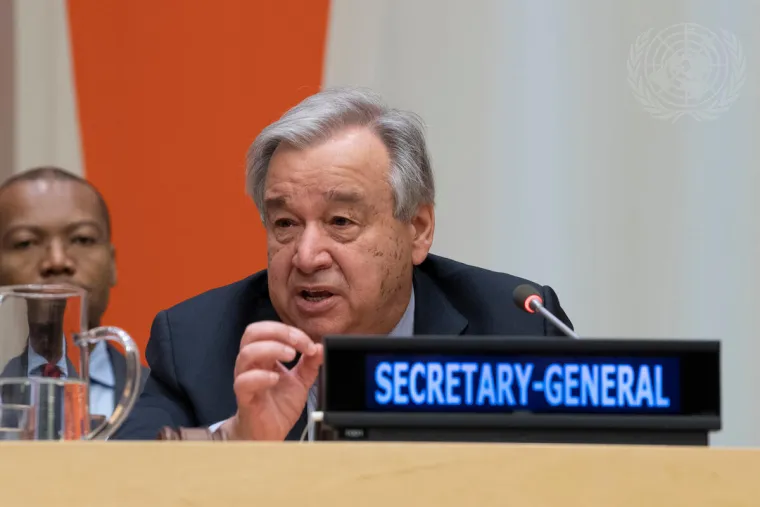International Heat Health Experts Help Shape United Nations’ Call to Action on Extreme Heat During Four Hottest Days on Earth
University of Arizona Associate Professor Ladd Keith and other global heat health and policy experts were meeting in Singapore during a record-setting heat wave and helped shape the U.N. Secretary-General’s call-to-action on extreme heat.

GHHIN members gathered in Singapore in 2024 during the four hottest days on Earth.
HRPC Team
When the members of the Global Heat Health Information Network (GHHIN) Management Committee gathered in Singapore at the end of July 2024, they already had a packed agenda.
The goals of the meeting included strategic planning for the network’s efforts through 2030, launching the GHHIN Southeast Asia Hub (a regional branch of the network) and preparing for the new hub’s Heat Health Forum scheduled for January 2025.
Then, suddenly, another priority emerged just as a global, record-breaking heat wave started making headlines.
Monday, July 22, 2024 – the first day of the meeting – was the hottest day ever recorded on planet Earth. That day, the average global temperature reached 17.16 degrees Celsius (62.89 degrees Fahrenheit), breaking the global temperature record of 17.09 C (62.76 F) set just the day before.
Things didn’t cool down on Tuesday, either, as the global average temperature reached 17.15 C (62.87 F) on July 23 – just 1/100th of a degree cooler than the brand-new record set the previous day – and Wednesday the 24th saw the same global average high as the record set on Sunday the 21st.
Prior to this four-day stretch of scorchers, the record high temp of 17.08 C (62.74 F) was set on July 6, 2023. And, before that, the record global high of 16.8 C (62.24 F) had held the top spot since August 13, 2016.
The bottomline: July 22-25 were the four hottest days in recorded history. The pace of global heating is clearly accelerating and, without drastic and rapid policy action from lawmakers around the world, all indications are that extreme heat events will become more frequent and more dangerous as time goes on.
Heat Wave Coincides with U.N. Secretary-General’s Call to Action

GHHIN members work in groups on strategic planning efforts.
HRPC Team
As an international and independent network of scientists, practitioners and policymakers initially spearheaded by the World Health Organization and World Meteorological Organization Joint Office for Climate and Health and the United States National Oceanic and Atmospheric Administration, the GHHIN has something of a direct line to administrative offices all over the world.
The members of the network are some of the most trusted scholars and advisors on the planet when it comes to identifying and evaluating strategies to improve the capacity of policymakers to “protect populations from the preventable health impacts of extreme ambient heat,” as per the organization's stated vision.
So, when the call from U.N. Secretary-General António Guterres’ office came in during the GHHIN Management Committee meeting, the experts present were more than happy to support and endorse the diplomat’s Call to Action on Extreme Heat.
Ladd Keith – Associate Professor of Planning at the University of Arizona College of Architecture, Planning & Landscape Architecture and Udall Center Faculty Research Associate – was in Singapore participating in GHHIN’s Management Committee meeting and took part in shaping the official statement.
“It was thrilling to be asked to help shape the U.N.’s call to action on extreme heat as we were planning the next few years of GHHIN’s activities and launching the network’s Southeast Asia Hub,” Keith says.
Keith says the group that worked on the statement was then able to watch together as Secretary-General Guterres delivered his remarks via video. “It was a real testament to the expertise and global impact of GHHIN,” said Keith.
The United Nations Calls Member States to Urgent Action

Secretary-General António Guterres speaks at his global town hall meeting with United Nations staff members.
UN Photo/Eskinder Debebe
In a press conference held on Thursday, July 25, 2024, Secretary-General Guterres called attention to the record-breaking temperatures of the past week while also pointing out that June 2024 was “officially the 13th consecutive month to break global temperature records.”
“Let’s face facts: extreme temperatures are no longer a one day, one week or one month phenomenon,” Guterres said, adding that “...Earth is becoming hotter and more dangerous for everyone, everywhere.”
Guterres highlighted recent heat-related emergencies around the world, including the death of 1300 pilgrims in Saudi Arabia during the annual Hajj, extreme heat advisories across the United States and school closures throughout Asia and Africa.
The Secretary-General also left little doubt as to who held the most responsibility for global rising temperatures. “We know what is driving it,” Guterres said, “fossil fuel-charged, human-induced climate change. And we know it’s going to get worse.”

The GHHIN meeting was held at the Yale-National University of Singapore campus.
GHHIN
With support from the experts at GHHIN, Guterres identified the following four critical areas as focal priorities for the international community:
- Caring for the vulnerable
- Protecting workers
- Boosting resilience of economies and societies using data and science
- Limiting temperature rise to 1.5 C by phasing out fossil fuels and scaling up investment in renewable energy.
Guterres asked countries to create climate action plans outlining their “nationally determined contributions” to the global heat-preparedness effort “by next year.”
“Leaders across the board must wake up and step up,” said Guterres. “That means governments – especially G20 countries – as well as the private sector, cities and regions. They must act as though our future depends on it – because it does.”
According to the experts, it was an odd stroke of fate that the U.N. statement on extreme heat came when it did, but record-breaking temps are going to continue to be the new normal unless drastic action is taken quickly.
“It was a coincidence that the U.N. Secretary-General’s Call to Action on Extreme Heat occurred during the four hottest days in recorded history,” said Keith. “But we know that records like these will continue to be broken as temperatures rise due to climate change. We need to rapidly increase and scale up our actions to address heat as a global threat.”
Read U.N. Secretary-General António Guterres’ statement on extreme heat here.

